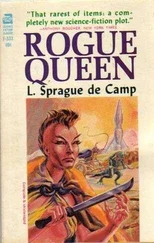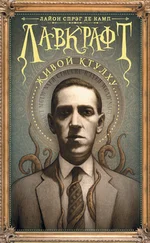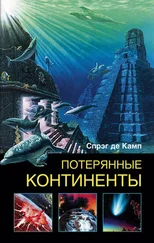Лайон Спрэг Де Камп Array - The Incomplete Enchanter
Здесь есть возможность читать онлайн «Лайон Спрэг Де Камп Array - The Incomplete Enchanter» весь текст электронной книги совершенно бесплатно (целиком полную версию без сокращений). В некоторых случаях можно слушать аудио, скачать через торрент в формате fb2 и присутствует краткое содержание. Год выпуска: 1975, Жанр: Фэнтези, на английском языке. Описание произведения, (предисловие) а так же отзывы посетителей доступны на портале библиотеки ЛибКат.
- Название:The Incomplete Enchanter
- Автор:
- Жанр:
- Год:1975
- ISBN:нет данных
- Рейтинг книги:3 / 5. Голосов: 1
-
Избранное:Добавить в избранное
- Отзывы:
-
Ваша оценка:
- 60
- 1
- 2
- 3
- 4
- 5
The Incomplete Enchanter: краткое содержание, описание и аннотация
Предлагаем к чтению аннотацию, описание, краткое содержание или предисловие (зависит от того, что написал сам автор книги «The Incomplete Enchanter»). Если вы не нашли необходимую информацию о книге — напишите в комментариях, мы постараемся отыскать её.
The Incomplete Enchanter — читать онлайн бесплатно полную книгу (весь текст) целиком
Ниже представлен текст книги, разбитый по страницам. Система сохранения места последней прочитанной страницы, позволяет с удобством читать онлайн бесплатно книгу «The Incomplete Enchanter», без необходимости каждый раз заново искать на чём Вы остановились. Поставьте закладку, и сможете в любой момент перейти на страницу, на которой закончили чтение.
Интервал:
Закладка:
«Ouch!» said Shea. «That’s almost as bad as Frege’s definition of number.»
Bayard droned: «The number of things in a given class —»
«Stop it, Walter! It drives me nuts!»
«— is the class of all classes that are similar to the given class.»
«Hrrm,» remarked Chalmers. «If you gentlemen are through with your joke, I’ll go on. If one of these infinite other worlds — which up to now may be said to exist in a logical but not in an empirical sense — is governed by magic, you might expect to find a principle like that of dependence invalid, but principles of magic, such as the Law of Similarity, valid.»
«What’s the Law of Similarity?» asked Bayard sharply.
«The Law of Similarity may be stated thus: Effects resemble causes. It’s not valid for us, but primitive peoples firmly believe it. For instance, they think you can make it rain by pouring water on the ground with appropriate mumbo jumbo.»
«I didn’t know you could have fixed principles of magic,» commented Shea.
«Certainly,» replied Chalmers solemnly. «Medicine men don’t merely go through hocus-pocus. They believe they are working through natural laws. In a world where everyone firmly believed in these Laws, that is, in one where all minds were attuned to receive the proper impressions, the laws of magic would conceivably work, as one hears of witch-doctors’ spells working in Africa today. Frazer and Seabrook have worked out some of these magical laws. Another is the Law of Contagion: Things once in contact continue to interact from a distance after separation. As you —»
Shea snapped his fingers for attention. «Just a second, Doctor. In a world such as you’re conceiving, would the laws of magic work because people believed in them, or would people believe in them because they worked?»
Chalmers put on the smile that always accompanied his intellectual rabbit-punches. «That question, Harold, is, in Russell’s immortal phrase, a meaningless noise.»
«No, you don’t,» said Shea. «That’s the favourite dodge of modem epistemologists: every time you ask them a question they can’t answer, they smile and say you’re making a meaningless noise. I still think it’s a sensible question, and as such deserves a sensible answer.»
«Oh, but it is meaningless,» said Chalmers. «As I can very easily demonstrate, it arises from your attempt to build your — uh — conceptualistic structure on an absolutistic rather than a relativistic basis. But I’ll come back to that later. Allow me to continue my exposition.»
«As you know, you can build us a self-consistent logic on almost any set of assumptions —»
Bayard opened his half-closed eyes and injected another sharp observation: «Isn’t there a flaw in the structure there, Doctor? Seems to me your hypothesis makes transference to the future possible. We should then become aware of natural laws not yet discovered and inventions not yet made. But the future naturally won’t be ignorant of our method of transference. Therefore we could return to the present with a whole list of new inventions. These inventions, launched into the present, would anticipate the future, and, by anticipating, change it.»
«Very ingenious, Walter,» said Chalmers. «But I’m afraid you overlook something. You might indeed secure transference to a future, but it would not necessarily be the future, the actual future of our own empirico-positivist world. A mental frame of reference is required. That is, we need a complete set of concepts of the physical world, which concepts condition the impressions received by the mind. The concepts of the future will be the product of numerous factors not new known to us. That is —»
«I see,» said Shea. «The frame of reference for the actual future is not yet formed, whereas the frames of reference for all past worlds are fixed.»
«Precisely. I would go beyond that. Transference to any world exhibiting such a fixed pattern is possible, but to such worlds only. That is, one could secure admission to any of H. G. Wells’ numerous futures. We merely choose a series of basic assumptions. In the case of the actual future we are ignorant of the assumptions.»
«But speculative extrapolation from our scanty supply of facts has already carried us — uh — halfway to Cloud-Cuckoo land. So let us return to our own time and place and devote ourselves to the development of an experimental technique wherewith to attack the problems of paraphysics.»
«To contrive a vehicle for transposition from one world to another, we face the arduous task of extracting from the picture of such a world as that of the Iliad its basic assumptions, and expressing these in logical form —»
Shea interrupted: «In other words, building us a syllogismobile?»
Chalmers looked vexed for an instant, then laughed. «A very pithy way of expressing it, Harold. You are wasting your talents, as I have repeatedly pointed out, by not publishing more. I suggest, however, that the term ‘syllogismobile’ be confined for the present to discussions among us members of the Garaden Institute. When the time comes to try to impress our psychological colleagues with the importance of paraphysics, a somewhat more dignified mode of expression will be desirable.»
* * *
Harold Shea lay on his bed, smoked, and thought. He smoked expensive English cigarettes, not because he liked them especially, but because it was part of his pattern of affectation to smoke something unusual. He thought about Chalmers’ lecture.
It would no doubt be dangerous, as Chalmers had warned. But Shea was getting unutterably bored with life. Chalmers was able but stuffy; if brilliance and dullness could be combined in one personality, Reed Chalmers combined them. While in theory all three members of the Institute were researchers, in practice the two subordinates merely collected facts and left to the erudite Doctor the fun of assembling them and generalizing from them.
Of course, thought Shea, he did get some fun out of his little poses, but they were a poor substitute for real excitements. He liked wearing his new breeches and boots, but riding a horse had been an excruciating experience. It also had none of the imaginary thrill of swinging along in a cavalry charge, which he had half-unconsciously promised himself. All he got was the fact that his acquaintances thought him a nut. Let ’em; he didn’t care.
But he was too good a psychologist to deceive himself long or completely. He did care. He wanted to make a big impression, but he was one of those unfortunates who adopt a method that produces the effect opposite to the one they want.
Hell, he thought, no use introspecting myself into the dumps. Chalmers says it’ll work. The old bore misses fire once in a while, like the time he tried to psychoanalyse the cleaning woman and she thought he was proposing marriage. But that was an error of technique, not of general theory. Chalmers was sound enough on theory, and he had already warned of dangers in the practical application in this case.
Yes. If he said that one could transport oneself to a different place and time by formula, it could be done. The complete escape from — well, from insignificance, Shea confessed to himself. He would be the Columbus of a new kind of journey!
Harold Shea got up and began to pace the floor, excited by the trend of his own thoughts. To explore — say the world of the Iliad . Danger: one might not be able to get back. Especially not, Shea told himself grimly, if one turned out to be one of those serf soldiers who died by thousands under the gleaming walls of Troy.
Not the Iliad . The Slavic twilight? No; too full of man-eating witches and werewolves. Ireland! That was it — the Ireland of Cuchulinn and Queen Maev. Blood there, too, but what the hell, you can’t have adventure without some danger. At least, the dangers were reasonable open-eye stuff you could handle. And the girls of that world — they were something pretty slick by all description.
Читать дальшеИнтервал:
Закладка:
Похожие книги на «The Incomplete Enchanter»
Представляем Вашему вниманию похожие книги на «The Incomplete Enchanter» списком для выбора. Мы отобрали схожую по названию и смыслу литературу в надежде предоставить читателям больше вариантов отыскать новые, интересные, ещё непрочитанные произведения.
Обсуждение, отзывы о книге «The Incomplete Enchanter» и просто собственные мнения читателей. Оставьте ваши комментарии, напишите, что Вы думаете о произведении, его смысле или главных героях. Укажите что конкретно понравилось, а что нет, и почему Вы так считаете.








